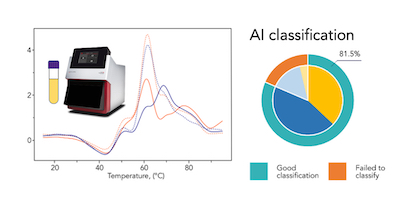
INP, Molecular Interaction & Pharmacology (team 9) and GlioME: Gliomagenesis and MicroEnvironment (team 8) are glad to share the release of their new work "Plasma nanoDSF Denaturation Profile at Baseline Is Predictive of Glioblastoma EGFR Status" which was done in collaboration with data scientists from Laboratoire Hubert Curien, UJM-Saint-Etienne and Laboratoire d'Informatique et Systèmes (LIS), Aix Marseille University and clinicians from Department of Neuro-Surgery, Department of Anatomopathology, Department of Molecular Oncology, and Department of Neurooncology, Timone Hospital, APHM. This is the proof-of-concert that we AI and plasma denaturation profiles can be combined to detect cancer molecular subtypes from a simple blood test.
Abstract : Glioblastoma (GBM) is the most frequent and aggressive primary brain tumor in adults. Recently, we demonstrated that plasma denaturation profiles of glioblastoma patients obtained using Differential Scanning Fluorimetry can be automatically distinguished from healthy controls with the help of Artificial Intelligence (AI). Here, we used a set of machine-learning algorithms to automatically classify plasma denaturation profiles of glioblastoma patients according to their EGFR status. We found that Adaboost AI is able to discriminate EGFR alterations in GBM with an 81.5% accuracy. Our study shows that the use of these plasma denaturation profiles could answer the unmet neuro-oncology need for diagnostic predictive biomarker in combination with brain MRI and clinical data, in order to allow for a rapid orientation of patients for a definitive pathological diagnosis and then treatment. We complete this study by showing that discriminating another mutation, MGMT, seems harder, and that post-surgery monitoring using our approach is not conclusive in the 48 h that follow the surgery.
see the twitter thread : https://twitter.com/inp_marseille/status/1618675101167423488?s=20&t=-Uj-ULhfPhmo79VZkPUOpg
access the article on Cancers website : https://www.mdpi.com/2072-6694/15/3/760

